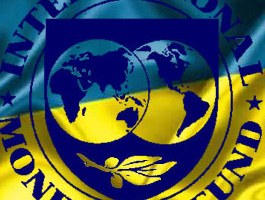
Ukraine Struggles to Secure Next IMF Tranche
Publication: Eurasia Daily Monitor Volume: 8 Issue: 28
By:

Ukraine is once again in difficult talks with the International Monetary Fund (IMF) to secure a much needed third tranche of the IMF’s $15 billion stand-by loan which was approved last July. This is another test for the ability of Prime Minister, Mykola Azarov, to reform the economy. Last year, it proved relatively easy to persuade the IMF to resume cooperation as Azarov’s predecessors had been non-cooperative, while the new government not only promised reform but made its first decisive steps such as launching tax and administrative reforms and domestic gas price hikes aimed at reducing the fiscal deficit. However, recently the government, apparently afraid of losing popularity ahead of the parliamentary elections scheduled for October 2012, became more reluctant to reform the economy. This may affect relations with the IMF and this is a warning signal for investors.
The IMF mission arrived in Kyiv on February 1 to assess whether Ukraine qualifies for the next loan tranche which the government hopes to receive in March. The mission is expected to complete its work by February 11. Ukraine badly needs the tranche as it heavily relies on loans because government funds are depleted after a 15 percent GDP plunge in 2009. Successful cooperation with the IMF makes other loans cheaper, stabilizes the domestic currency which lost some 40 percent of its value in the 2008 crisis and is still weak, and is important to attract investors ahead of the 2012 European soccer championship for which the government pledged to overhaul Ukraine’s infrastructure of roads, hotels and stadiums –neglected for decades. This will be impossible without foreign participation.
IMF mission head, Thanos Arvanitis, meeting Azarov on February 4 reportedly admitted that Ukraine has achieved much in restoring financial stability and trust in the banking system. Arvanitis also stated that growth trends were observed in the economy, as GDP rose by more than 4 percent last year. However, Arvanitis made it clear that the IMF does not think Kyiv is doing enough. Arvanitis insisted that government spending should be further decreased, value-added tax (VAT) must be refunded automatically to exporters unlike in the previous two years when many domestic and foreign companies complained that the government did not play fair, and that the long overdue pension reform should be launched as soon as possible (www.kmu.gov.ua, February 4).
The IMF is adopting a tough but correct position. Ukraine’s state budget deficit last year exceeded the 5.5 percent of GDP agreed with the IMF, VAT is not refunded automatically despite Azarov’s promises, and the cabinet has not yet submitted a pension reform bill to parliament although it had promised the IMF that it would do so by January. Deputy Prime Minister, Serhy Tyhypko, who is in charge of pension reform, forecast last month that parliament would pass a pension reform bill in March (UNIAN, January 18). The pension reform will be unpopular as it provides, as the IMF insisted, for hiking the retirement age for women from the current 55 to 60 years within the next ten years and for male civil servants from 60 to 62 years.
The cabinet is even more reluctant to increase household gas prices from April 2011, also as promised to the IMF last year, in order to reduce the deficit of the state-owned oil and gas company, Naftohaz Ukrainy. First Deputy Prime Minister, Andry Klyuyev, told a press conference on February 2 that the cabinet was against raising natural gas prices for households in either April or May. Klyuyev said this would be discussed with the IMF (UNIAN, February 2). The previous 50 percent price increase last August was welcomed by the IMF, but it was not enough to cover the difference between the high prices that Naftohaz pays for Russian gas and the low prices for which it is obliged to sell gas at home.
The government has to take much needed, but unpopular, steps sooner because it will hardly risk doing so closer to the upcoming elections. The Azarov government may fall into the same trap as its predecessors, such as the cabinet of former Prime Minister, Yulia Tymoshenko, who refused to take unpopular measures ahead of the January-February 2010 presidential elections which she had hoped to win (EDM, November 4, 2009). As a result, the IMF suspended its loan program which further exacerbated the situation in the economy.
Azarov said, speaking ahead of his meeting with Arvanitis on February 4 that the conditions of cooperation with the IMF should be revised. Azarov explained that there were problems with economic growth (UT1, February 4). This means that Kyiv either expects the IMF to turn a blind eye to the government’s failure to meet some of its conditions and proceed with the next tranche as if nothing had happened, or it wants the IMF to increase the volume of assistance. In either case, the talks with the IMF will be complicated and the next tranche may be delayed.




